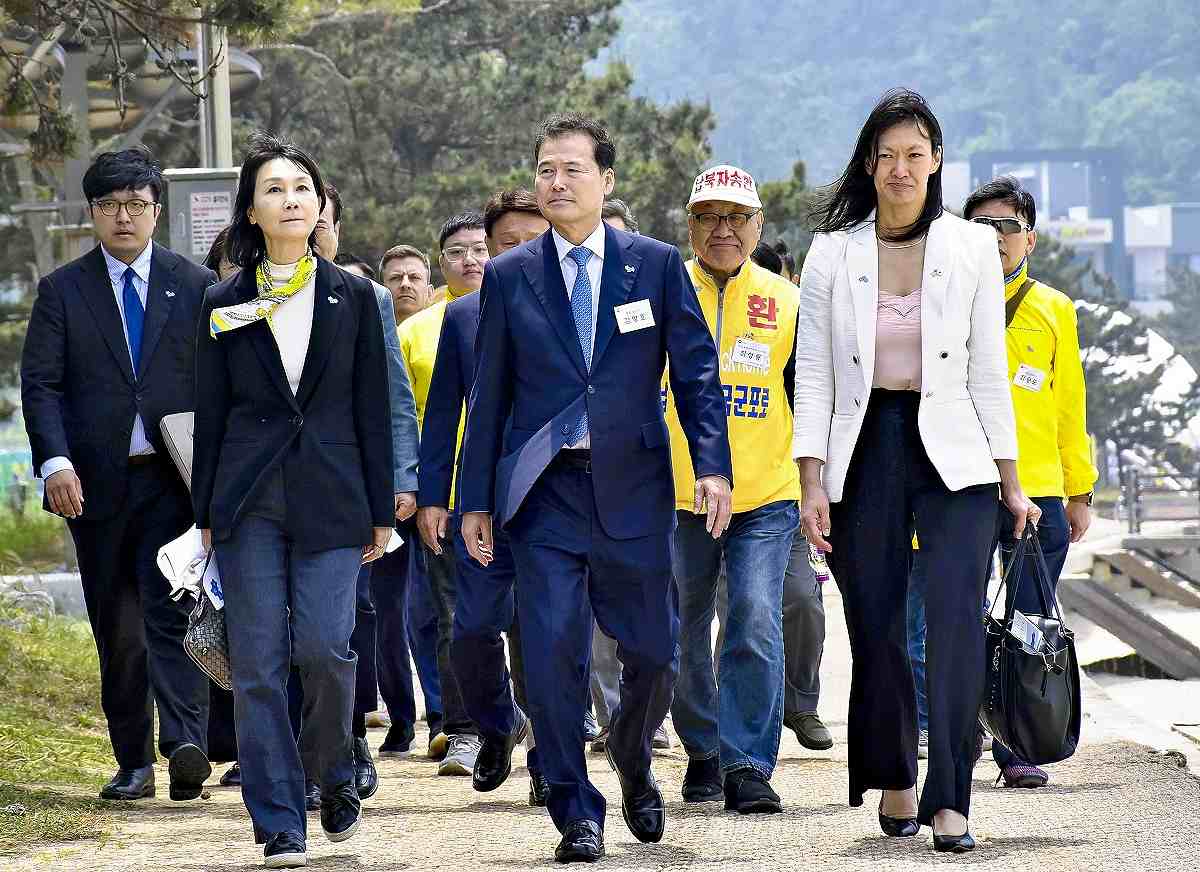South Korean Unification Minister Visits Abduction Site; Showing Seoul’s Commitment to Return of Abductees

South Korean Unification Minister Kim Yung-ho, center, and Julie Turner, right, visit a site of an abduction by North Korea on Seonyudo Island in South Korea on Friday.
17:21 JST, May 25, 2024
SEOUL — South Korean Unification Minister Kim Yung-ho on Friday visited a site in southwestern South Korea, where a South Korean man believed to be the former husband of Megumi Yokota had been abducted by North Korea.
This is the first time a South Korean unification minister has visited such an abduction site. The visit showed Seoul’s intention to take a firm stance against Pyongyang on human rights issues.
“An innocent high school student who went to the beach with his friends became a victim,” the unification minister said on the Seonyudo Beach in Jeonbuk-do, where Kim Young-nam, now 62, was abducted in the late 1970s. “We will do our utmost until the day the abduction victims are returned.″
On Friday, the minister attended the ceremony to unveil a monument to pray for the return of the abduction victims.
The attendees included Julie Turner, the U.S. State Department’s special envoy on human rights issues in North Korea who, in February, visited the site in Niigata where Yokota was abducted at the age of 13. She stressed that the United States, South Korea and Japan would gather their strength to increase pressure on North Korea.
In South Korea, fishermen and many others have been kidnapped by North Korea. About 500 people have not yet been repatriated. However, interest in the abduction issue has been low in South Korea, as it has been regarded as an obstacle to dialogue between the two Koreas, especially by leftists who are more conciliatory toward the North. Previously, successive South Korean administrations were also not keen to resolve the issue.
Seoul has made a policy shift since the conservative administration of President Yoon Suk Yeol was launched in May 2022. At the Japan-U.S.-South Korea summit in August last year, the three countries affirmed their commitment to addressing North Korean human rights issues, including the abductions. Subsequently, Seoul set up a new team under the direct oversight of the Unification Ministry in September to tackle the issue of South Korean abductees.
In February, a symbol with a flower motif was unveiled for a rescue campaign for the abductees, and the wearing of symbolic blossom badges has spread.
“I wonder why it has taken so long, but hope has finally been born,” said a 77-year-old relative of Kim Young-nam who participated in the ceremony. “I want to see my brother again.”
Top Articles in World
-

China Confirmed to Be Operating Drilling Vessel Near Japan-China Median Line
-

China Eyes Rare Earth Foothold in Malaysia to Maintain Dominance, Counter Japan, U.S.
-

Japan, Qatar Ministers Agree on Need for Stable Energy Supplies; Motegi, Qatari Prime Minister Al-Thani Affirm Commitment to Cooperation
-

North Korea Possibly Launches Ballistic Missile
-

10 Universities in Japan, South Korea, Mongolia to Establish Academic Community to Promote ICC Activities, Rule of Law
JN ACCESS RANKING
-

Univ. in Japan, Tokyo-Based Startup to Develop Satellite for Disaster Prevention Measures, Bears
-

JAL, ANA Cancel Flights During 3-day Holiday Weekend due to Blizzard
-

China Confirmed to Be Operating Drilling Vessel Near Japan-China Median Line
-

China Eyes Rare Earth Foothold in Malaysia to Maintain Dominance, Counter Japan, U.S.
-

Japan Institute to Use Domestic Commercial Optical Lattice Clock to Set Japan Standard Time






















